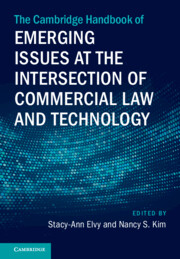Book contents
- The Cambridge Handbook of Emerging Issues at the Intersection of Commercial Law and Technology
- The Cambridge Handbook of Emerging Issues at the Intersection of Commercial Law and Technology
- Copyright page
- Epigraph
- Contents
- Figures
- Tables
- Contributors
- Preface
- Acknowledgments
- Part I Contemporary Technological Developments
- Part II The Implications of Emerging Product Design and Business Models
- Part III Contracting and Dispute Resolution
- 14 Contract and Commercial Law Challenges with AI Products and Services
- 15 How Smart Are Smart Readers? LLMs and the Future of the No-Reading Problem
- 16 Deconstructing Smart Contracts
- 17 Artificial Intelligence and Contract Formation
- 18 Consumer Contracting in the Smartphone Era
- 19 Evolution and Emerging Issues in Consumer Online Dispute Resolution (ODR)
- Index
17 - Artificial Intelligence and Contract Formation
Back to Contract as Bargain?
from Part III - Contracting and Dispute Resolution
Published online by Cambridge University Press: 08 February 2025
- The Cambridge Handbook of Emerging Issues at the Intersection of Commercial Law and Technology
- The Cambridge Handbook of Emerging Issues at the Intersection of Commercial Law and Technology
- Copyright page
- Epigraph
- Contents
- Figures
- Tables
- Contributors
- Preface
- Acknowledgments
- Part I Contemporary Technological Developments
- Part II The Implications of Emerging Product Design and Business Models
- Part III Contracting and Dispute Resolution
- 14 Contract and Commercial Law Challenges with AI Products and Services
- 15 How Smart Are Smart Readers? LLMs and the Future of the No-Reading Problem
- 16 Deconstructing Smart Contracts
- 17 Artificial Intelligence and Contract Formation
- 18 Consumer Contracting in the Smartphone Era
- 19 Evolution and Emerging Issues in Consumer Online Dispute Resolution (ODR)
- Index
Summary
Some commentators have said that artificial intelligence (AI) is advancing rapidly in substantial ways toward human-like intelligence. The case may be overstated. Advances in generative AI are remarkable, but large language models (LLMs) are talkers, not doers. Moves toward some kind of robust agency for AI are, however, coming. Humans and their law must prepare for it. This chapter addresses this preparation from the standpoint of contract law and contract practices. For an AI agent to participate as a contracting agent, in a philosophical or psychological sense, with humans in the formation of a contract, the following requirements will have to be met: (1) the AI in question will need to possess the cognitive functions to act with intention and that intention must cause the AI to take a particular action; (2) humans must be in a position to recognize and respect that intention; (3) the AI must have the capacity to engage with humans (and other AI) in shared intentions, meaning the cognitive capacity to share a goal the parties can plan for and execute; (4) the AI will have to have the capacity to recognize and respect the practical authority of law and legal obligation; (5) the AI will have to have the capacity to recognize and respect practical authority in a claim accountability sense, in accepting that a contract forms a binding commitment to others. In other words, the AI will not only have to be able to engage in shared intentionality but also understand and accept it as a binding commitment recognized by the law; and (6) the AI will have to possess the ability to participate in these actions with humans or in some hybrid form with humans.
- Type
- Chapter
- Information
- The Cambridge Handbook of Emerging Issues at the Intersection of Commercial Law and Technology , pp. 397 - 414Publisher: Cambridge University PressPrint publication year: 2025

